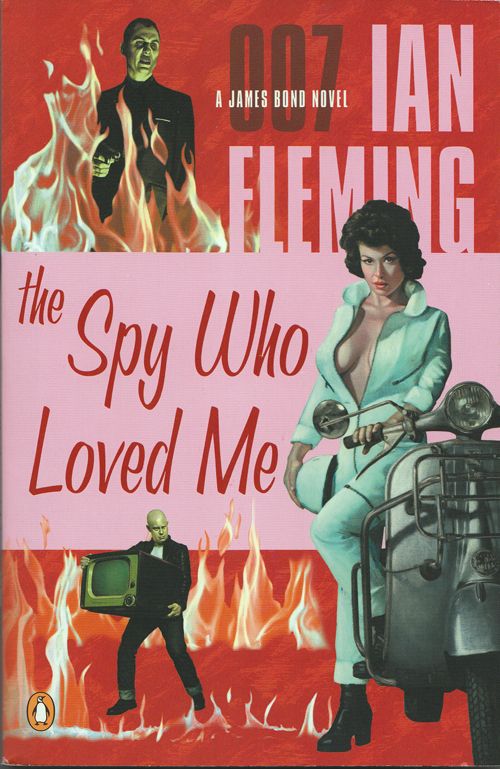

“Nothing makes one really grateful for life except the black wings of danger.”
Oof, The Spy Who Loved Me is bad. Really bad. For starters, it’s not really a James Bond novel at all; the character only functions as a deus ex machina for the book’s protagonist. That’s already gonna sap much of the appeal for readers of the series. But Fleming also does the unthinkable—he writes the entire thing from a first-person female perspective. For an author who has always walked a tightrope concerning the treatment of his female characters, getting inside the head of one seems an impossible task. Predictably, he fails miserably at it. In the process, he reveals a perverted mindset that his previous novels had mostly kept on the fringes.
Fleming is quoted in Henry Chancellor’s series’ companion, James Bond: The Man and His World, as saying, “I had become increasingly surprised to find my thrillers, which were designed for an adult audience, being read in schools, and that young people were making a hero out of James Bond […] It crossed my mind to write a cautionary tale about Bond, to put the record straight in the minds particularly of younger readers […] The experiment has obviously gone very much awry.” The reception to the book was so negative that Fleming requested it not be reprinted—which it wasn’t, until after his death—and would not allow the plot to be used for the film version.
So what had all of the critics up in arms? There are two main issues that go hand in hand, and that I mostly agree with: Fleming’s general attitude towards women and the fact that he spends the bulk of the novel telling the story of one while James Bond waits for his grand entrance in Act 3. I think a clue for the tone of the novel is indicated by the fact that it was published in a magazine under the title Hotel Nymph. If that makes you think of some sleazy softcore pulp then you’re in the right ballpark.
Our main character, one Vivian Michel, is given a breakneck backstory detailing a pair of love affairs that left her emotionally damaged and physically violated. In semi-explicit detail, we read of her near-arrest for indecent exposure as she loses her virginity in a movie theater, after which she and her lover finish things off in a barren field. Then she has a fling with her caricatured German boss who, upon finding out she is pregnant, ends the affair and sends her to Switzerland for an abortion. These failed relationships are what Fleming uses to define Viv. Her upbringing, occupation, and religion are touched upon, but only frivolously. And her abortion comes across as a blip.
It was as mentally distressing but as physically painless as I had expected, and three days later I was back in my hotel. My mind was made up.
Of course, what Vivian really needs is a real man, and we can all guess who that real man is. That’s right, Mr. James Bond, womanizer extraordinaire. Within a few mostly forgettable chapters, Vivian finds herself agreeing to work as the sole caretaker of The Dreamy Pines Motor Court for a few days just before it closes for the season. The night before the owner is set to arrive and release her from her duties, two “insurance men” show up to burn down the motel so the owner can collect a hearty insurance payout.
They need to pin it on Vivian, which means the plan is for her to die in the fire. Of course, they can’t be professional about it; these guys are hardened killers, but they’re also sex fiends, apparently. Just as they start ripping Vivians clothes off of her, the buzzer rings and at the door is James Bond, who just so happens to be limping along on a flat tire and needs somewhere to stay for the night.
Bond is her knight in shining armor, who quickly rights everything that’s wrong with the world and is rewarded with the standard James Bond trophy—an evening of sex. But Fleming is so jumbled up here that he can’t seem to figure out how to move away from his protagonist’s previous sexual encounters, and so he punctuates her and Bond’s love-making with this cringeworthy little nugget:
All women love semi-rape. They love to be taken. […] I had no regrets and no shame. There might be many consequences for me—not the least that I might now be dissatisfied with other men. […] And for all my life I would be grateful to him, for everything. And I would remember him for ever as my image of a man.
Uh huh. After all those regrets from giving herself away to men that didn’t care for her, and all that determination to not be taken advantage of again, the highlight of her life is going to be getting roughhoused by a playboy who is gone when she wakes up in the morning and left the bullet-riddled corpse of her assailant right outside her motel window.
Basically, Fleming took away all of the standard Bond stuff—the first encounter with the villain, the tense sneaking about, the high-stakes card games, food, and drink—and replaced them with a handful sexual fantasies from a female perspective. All we get from Bond is the climax, which, even if it had a good buildup, is third-rate. The only thing that is worth salvaging from this book is the character of Horror, who became Jaws in The Spy Who Loved Me and Moonraker films. All the rest is garbage.
Sources:
Chancellor, Henry. James Bond: The Man and His World. John Murray Publishers. 2005.
Simpson, Paul. The Rough Guide to James Bond. Rough Guides. 2002.